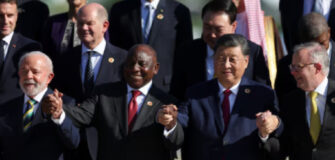Share
Namibia on the Brink of a Historic Election: SWAPO Aims to Maintain Its Longstanding Power
Namibia is at a pivotal crossroads, gearing up for an election that could significantly alter its political trajectory. The ruling SWAPO (South West Africa People’s Organization) party is determined to retain its grip on power for an impressive 34th consecutive year. Spearheading this effort is Vice President Netumbo Nandi-Ndaitwah, whose candidacy marks a revolutionary moment for Namibia, with the potential to make her the first female president in the nation’s history. This extraordinary opportunity reverberates through the annals of Namibian politics, yet the road ahead for SWAPO is laden with formidable challenges.
As the election approaches, SWAPO faces mounting scrutiny regarding pressing issues that cannot be ignored. High unemployment rates afflict the population, income inequality has left many in despair, and severe allegations of corruption have damaged the party’s credibility. These pressing concerns have fueled dissatisfaction, especially among younger voters who, feeling disenchanted, are actively exploring alternatives to the entrenched SWAPO.
The Stakes Are High:
Despite the growing discontent, SWAPO may still harness support from its solid traditional base, primarily comprising older, rural voters who have consistently backed the party. This demographic remains fiercely loyal to SWAPO, buoyed by the party’s legacy of liberation and its vital role in Namibia’s independence—an enduring symbol of hope within their communities.
The current election cycle features a remarkable lineup of 14 candidates vying for the presidency. Among them is the notable challenger, Panduleni Itula, who narrowly missed victory as the runner-up in the 2019 elections. His persistent presence in the race embodies a robust opposition eager to challenge SWAPO’s longstanding dominance.
Understanding the Process:
To secure the presidency, a candidate must garner more than 50% of the votes. A runoff election will determine the winner if no candidate meets this crucial benchmark. With around 1.4 million registered voters in a nation of approximately 3 million, a significant segment of the electorate is prepared to partake in this vital democratic exercise. Anticipation for the election results is palpable, with preliminary outcomes projected to be announced mere days after voting.
As Namibia embarks on this landmark election, the stakes for both SWAPO and its rivals are exceptionally high, setting the stage for a potential shift that could reshape the nation’s political landscape.
image Source:businesslive.co.za


